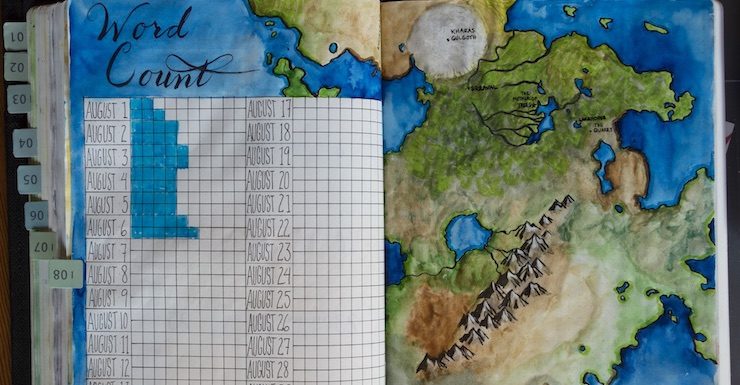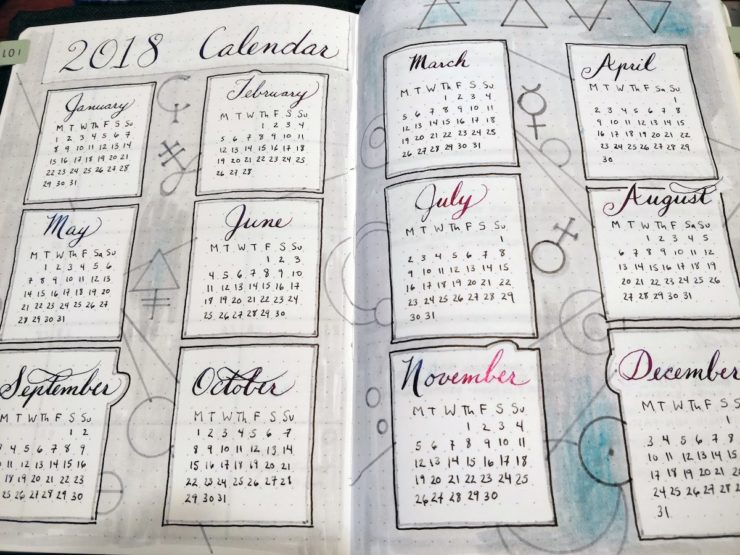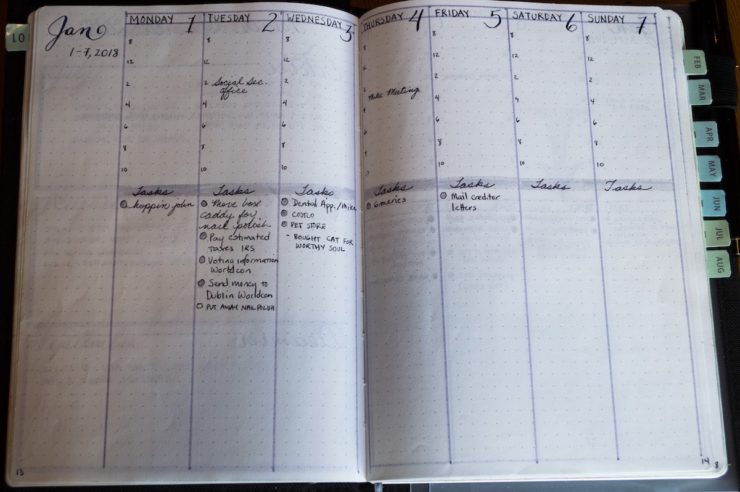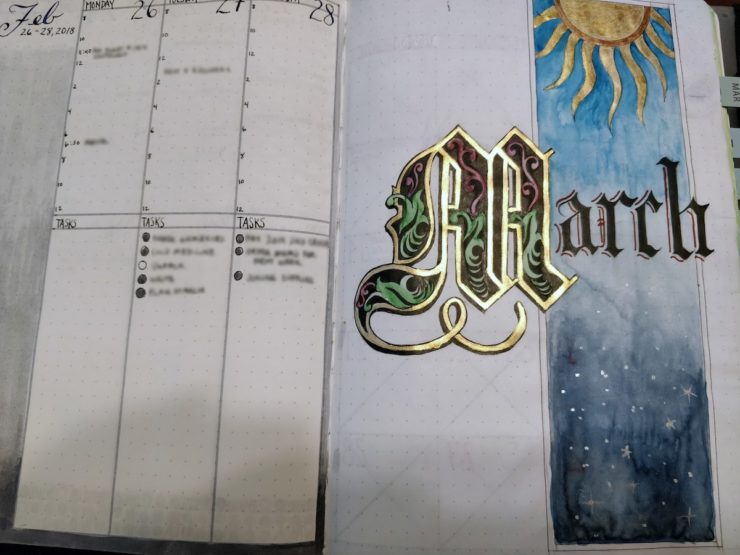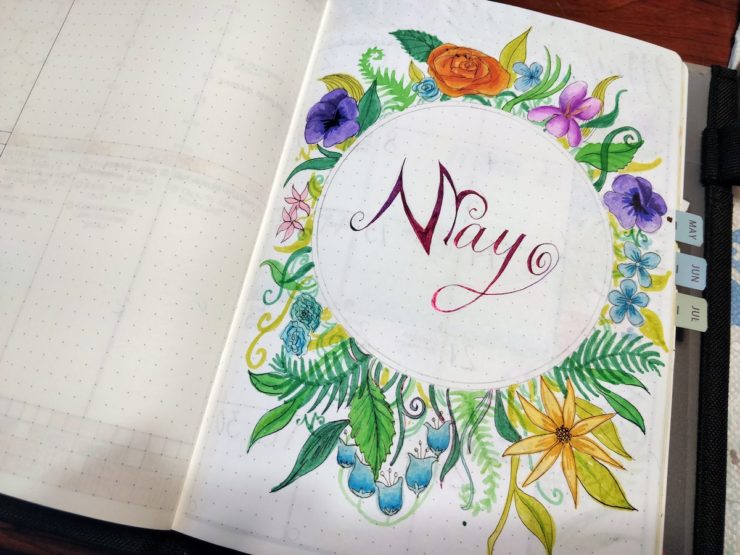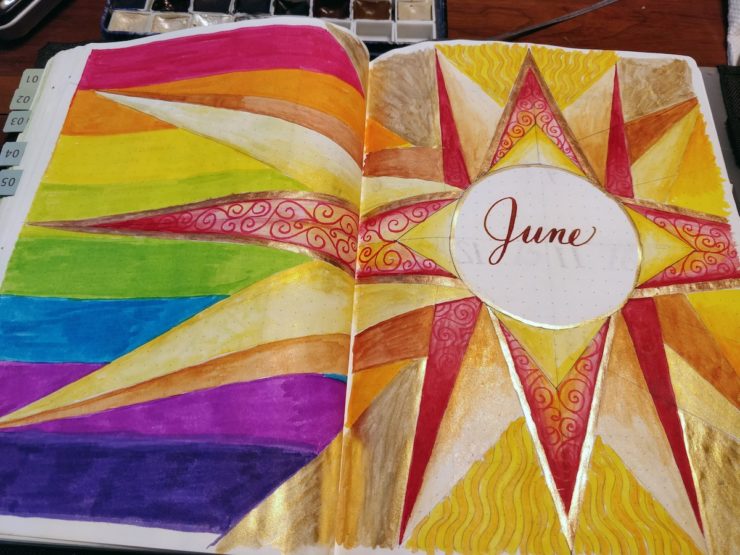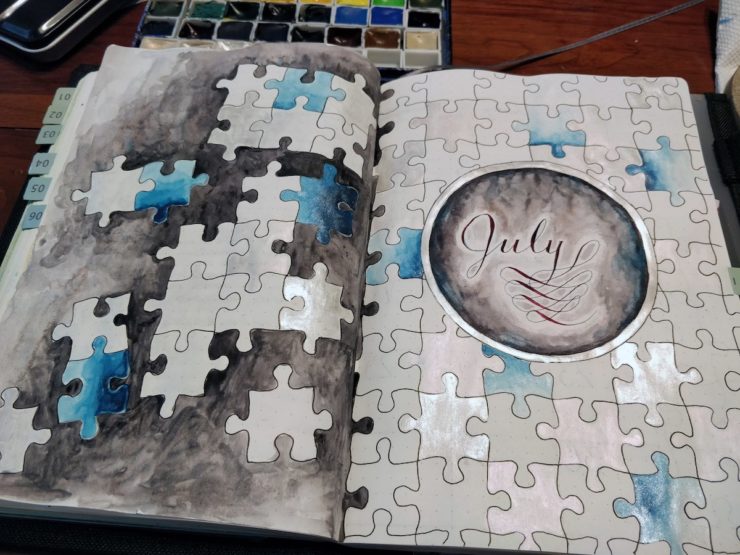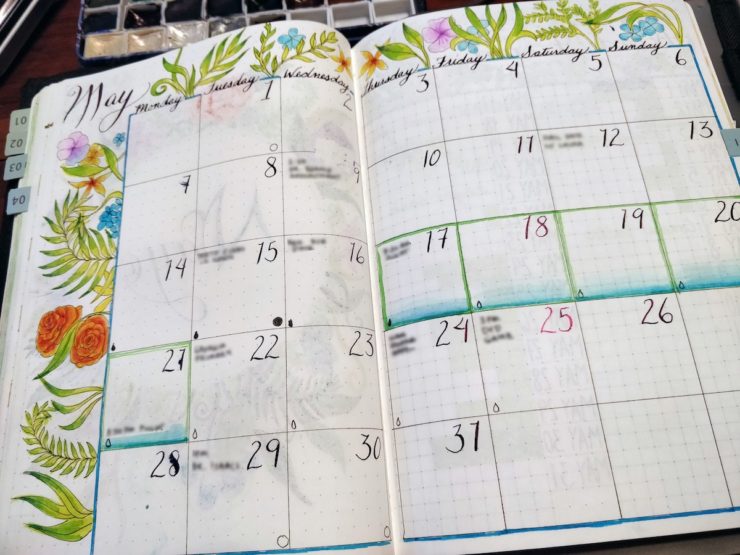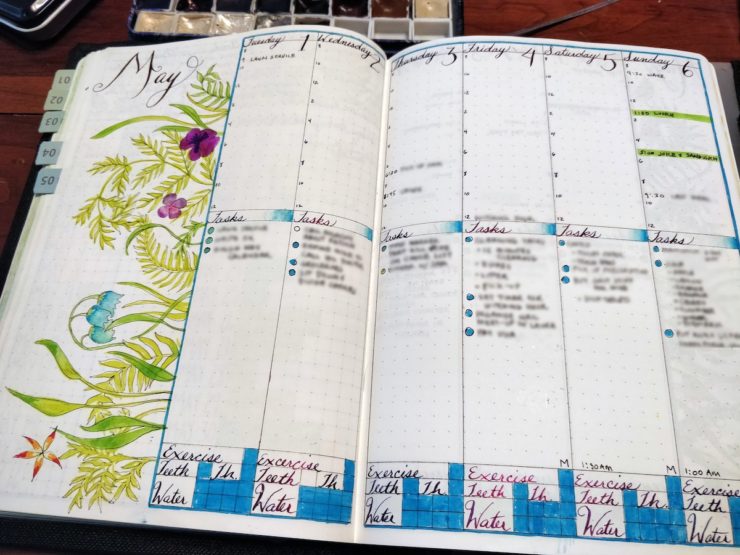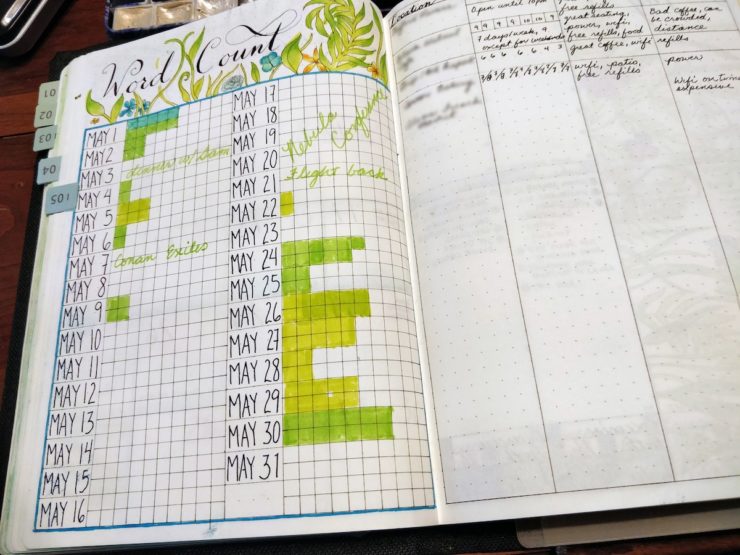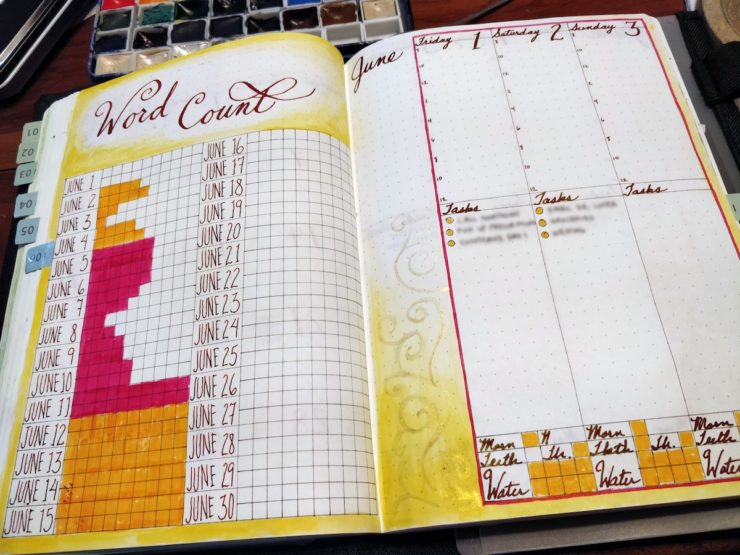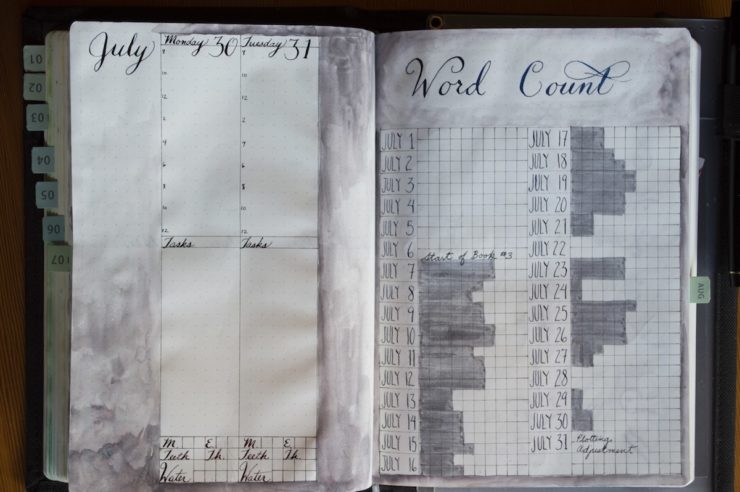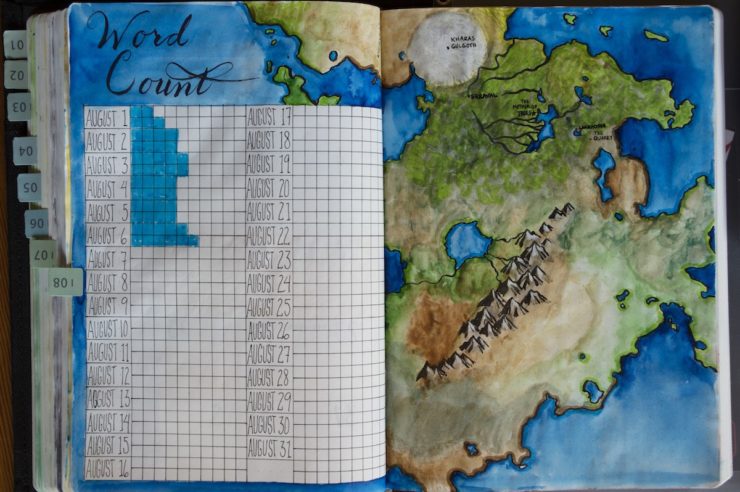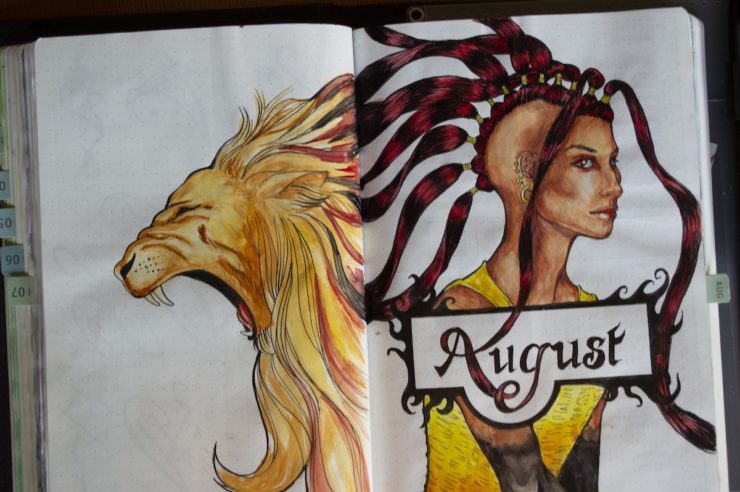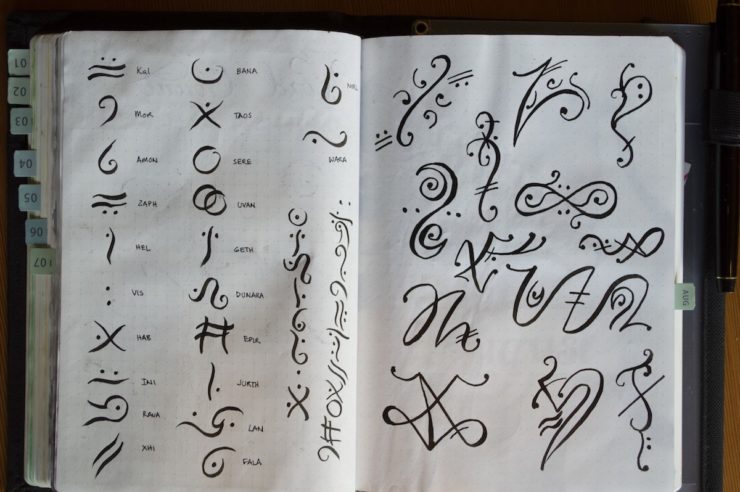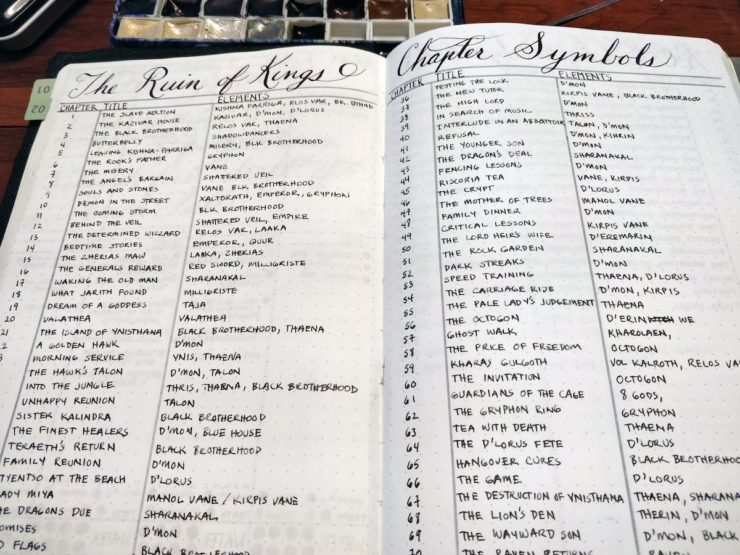Have you ever heard of bullet journaling? Its basic concept is simple: instead of using a day planner with formally assigned pre-printed pages, a bullet journal starts out completely blank. You assign pages in the front to be an index, and then write down important information and to-do lists as you go. Any time you want to dedicate space to a special subject (say ‘Plot Notes’) you can do so while just jotting down the page numbers of that topic back in the index. Its primary power lies in its versatility. It’s not just a day planner: it’s a to-do list combined with a day planner plus a journal with a healthy dollop of idea book mixed together with…well…honestly anything you might want to write or draw.
There are, to misquote one of my favorite pirates, no rules with bullet journals, only guidelines.
As a fantasy writer, I am a big fan. When I’m in my writing zone, all other details of adulting go away, which means I’m quite capable of forgetting to pay bills, buy groceries, or remember when my flight leaves unless I write reminders to myself. To-do lists are my best friends.
It can’t really be a surprise that what works best for me as a writer is, well, writing, can it?
Yet I know a lot of writers who never start bullet journaling, despite being interested. Why? Well, if you’re anything like me, you’ve seen those articles. Easy bullet journaling for people who can’t draw! How to be more efficient with bullet journaling! Organize your entire life and finally get your act together, you lazy jerk!
Okay, maybe not that last one.
Buy the Book
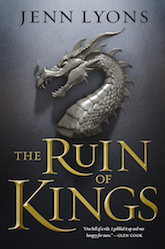

The Ruin of Kings
I always felt like that was the subtext, though. What follows is usually not a discussion on bullet journaling at all, but a discussion on bullet journal decorating, with a granular breakdown of the washi tape, brush markers, and cute emoji stickers that you simply must have or why are you even bothering? (Adorable efficiency is big business.)
While this may be well-intentioned, in my opinion there is a very real danger that it turns something that was supposed to help you reduce stress and mental clutter into an obligation that buries you under another level of guilt. What if I’m not an artist? What if I don’t want to spend countless hours decorating my journal with several hundred dollars’ worth of etsy accessories? What if that’s just too much damn pressure, okay? You’re not the boss of me, paper products!
So, consider this permission to create a bullet journal that doesn’t contain a single piece of art. No washi tape. No illustrated monthly splash pages. Not a single beautifully lettered title. You do not need any of this. The purpose of a bullet journal is to make your life easier. That’s it.
Any part of bullet journaling that doesn’t do that can be safely and guiltlessly discarded. You have my permission. Do it, guilt-free. Likewise, if you feel like you’d be better served by changing something, change it. There is no wrong way to do this. And supplies? Whatever. Doesn’t matter. 99¢ College examination books work just as well as official Leuchtturm1917 bullet journals or imported Tomoe River notebooks. You will probably find a dot grid more useful than graph or lined notebooks, but all that’s really required is some kind of paper and some method of marking marks on that paper. The rest is up to you.
And lastly, I apologize.
Because I’m also an artist. That’s right: I’m THAT person.
That means that my bullet journal is, well, extra. It’s exactly the sort of bullet journal that serves to prove to someone else that they should never bullet journal, because they’re not an artist and so it won’t come out looking anything like this. But for me, my bullet journal is a source of personal joy, a reminder of my blessings. The art is not a source of stress, but a chance to recharge. It’s also a reminder that I’m not perfect, because I mess up in it all the time.
Okay, with that out of the way, let’s show you some pictures. (Click any image to enlarge.)
I started off the year with every intention of keeping things simple. Now, this is not the bullet journal format typically shown. My basic deviation from traditional bullet journaling was realizing that I wanted a more day-planner-like grid for appointments and tasks so I could see everything on one page. All you need to do this is a pen and a ruler. (Also, a good example of how you are the boss of this process, and how you can modify it to fit your own needs.)
That lasted two months. By March, I’d broken out my watercolors. It was a bit of a whim: my partner had started calling my bullet journal “The Book of Days” and I went with it. The watercolor wrinkled the paper a bit, but I was surprised at how well it held up. After that, there was no turning back.
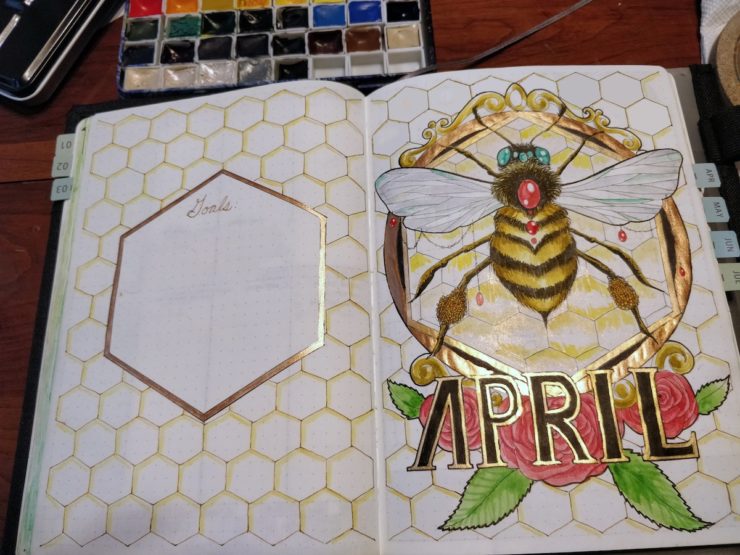
Besides the day-planner format, the other way my bullet journal is different than most is that my needs are unique (I bet yours are too). I prefer to track habits by day than all in one giant chart. I don’t use inspirational quotes. I don’t need an index because I’m using tabs. I forget to number the pages. Whereas I do need a place to jot down notes, brainstorming , track my daily word count, create packing lists for trips, and document world-building details when I may not have access to my computer. On occasion, I even draw in it. That is really the point of it all: bullet journaling can be a fantastic tool, but only if you’re modifying it to your own needs.
Also, and I think this is important: don’t feel a lick of guilt if you just don’t feel like doing it sometimes. The advantage it has over day-planners, calendars, or other forms of paper time-management is that blank paper places no blame. You don’t feel like using your bullet journal for a couple of months? It won’t judge you, and it will be just as ready for you when you return.
This is far more like a day planner than a normal bullet journal, but I like being able to look at the full week at a time. However, this does require some set-up with a ruler. If you don’t want to be bothered (I wouldn’t blame you) then you don’t have to! Being able to adjust this to your own preferences is one of bullet journaling’s greatest strengths.
While I certainly can track my word count in an excel spread sheet, I prefer to do so here first. Each box is 500 words, and why yes, this is the start of the 3rd book in my Godslayer series.
Plus, I can have fun with word counts: for example, drawing out the lower continent so I can fill out the map a little more…although I hadn’t gotten around to that when I took this picture. Ahem.
Monthly spreads are completely extra – you don’t need this at all! That said, if you want a monthly splash page, you’re also under no obligation to make this something you have drawn. You can scrap-book something, use a print-out of a favorite piece of art – or skip it.
I also use my bullet journal for notes (in this case what sort of symbols I needed to draw for the chapter headings), plotting, whatever. (I’m not going to show you any of the plotting pages: spoilers, people!)
Bullet journaling really can help you keep your life (and writing) more organized. Just don’t let bullet journaling become such a tired obligation that it joins the ranks of all the other tasks you may be forgetting to do. Like writing itself, bullet journaling is an effort where you’ll want to say you did it your way.
By the way, if you’re not familiar with traditional bullet journaling and would like to understand the basics, the video that started it all is here.
Originally published in September 2018.
Read the first 17 chapters of Jenn’s novel The Ruin of Kings here.
 Jenn Lyons lives in Atlanta, Georgia with her husband, three cats, and a nearly infinite number of opinions on anything from mythology to the correct way to make a martini. Her debut epic fantasy novel, The Ruin of Kings, is available from Tor Books.
Jenn Lyons lives in Atlanta, Georgia with her husband, three cats, and a nearly infinite number of opinions on anything from mythology to the correct way to make a martini. Her debut epic fantasy novel, The Ruin of Kings, is available from Tor Books.










